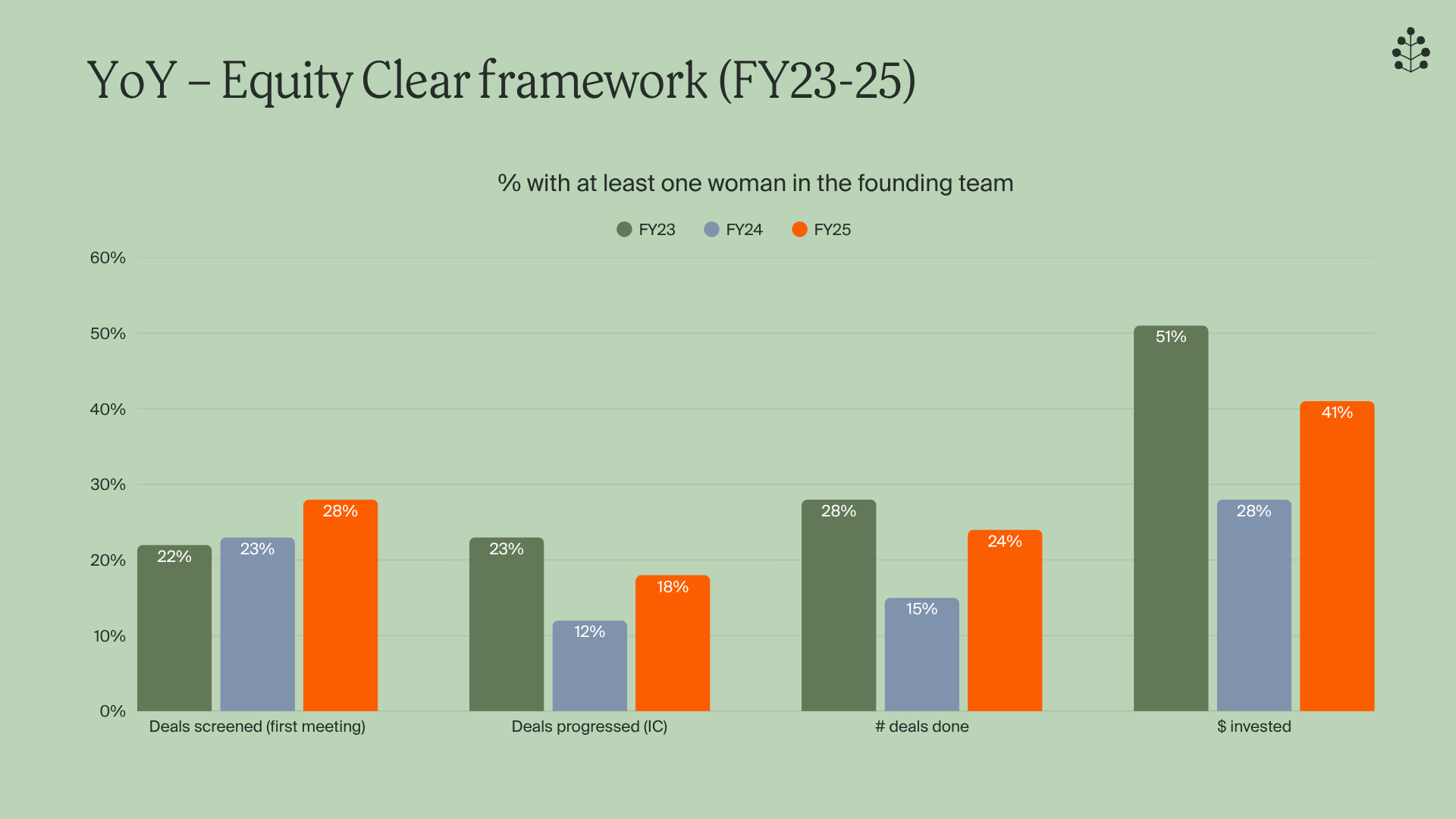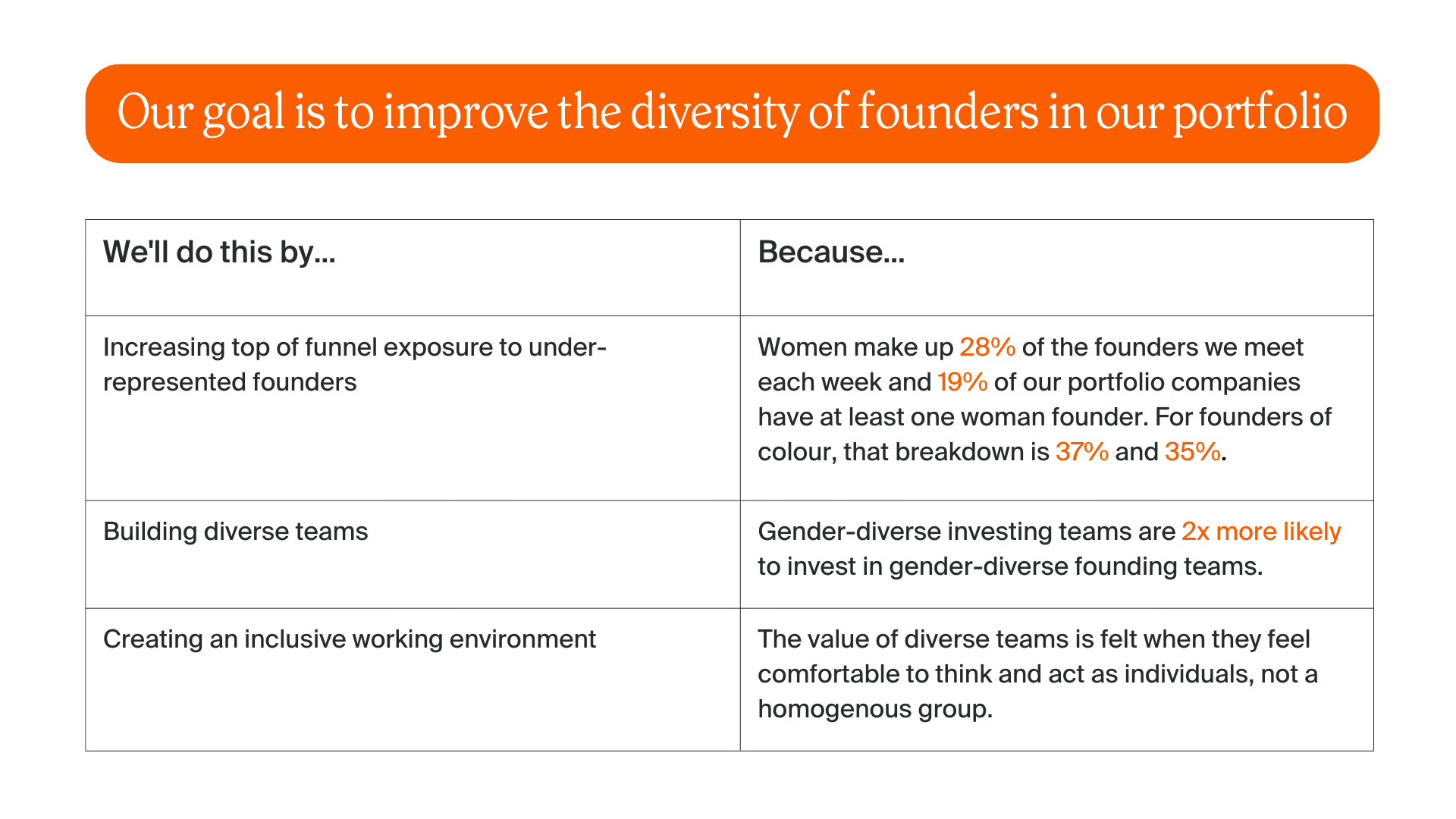.png)
.png)
Gender inequality is a known issue in the ANZ venture capital and startup ecosystem. It is also well understood that what gets measured, gets managed.
That’s why an important element of Airtree’s diversity, equity and inclusion (DEI) strategy is data collection and public reporting. We believe this transparency is an important lever for accountability and building industry momentum.
Airtree joined the Equity Clear initiative at its inception, and reports under this framework each year. We will continue to support this initiative to grow and encourage broader industry participation. Below is our updated data for FY25, a summary of how we think about this important issue, and what we are doing to hold ourselves accountable to improving it.
Our FY25 data


Our team diversity in FY25

Our numbers are not where we want them to be, yet. Whilst we have achieved a 40:40:20 ratio in our team diversity, our goal is to reach 40% of teams at IC with at least one female founder. This is where the management side of our strategy comes in.
How Airtree is promoting diversity in the ecosystem
The ANZ VC and startup ecosystem is a unique network of incredible people — from founders and operators, to investors and angels. This ecosystem is producing world-class startups and unicorns, and we think it’s the most exciting industry to be a part of.
That’s why our approach to promoting diversity includes not only our work within Airtree, but also the role we can play externally to invite people in. We want to see the ecosystem grow and benefit from the participation of diverse voices, experiences and backgrounds.
Our approach
- Our Pioneers Community for female and gender diverse founders, operators and startup-curious talent to learn from one another and build connections
- Our Explorers Program, currently on its 9th cohort, to cultivate the next generation of angel investors in Australia and New Zealand, which includes more than 47% women in the 500+ angels we have trained
- Our work with community partners, such as our Pledge 1% partner (selected each financial year)
- Events hosted or supported via partnerships that platform underrepresented founders or create opportunities for connection and learning
- Open Source VC with curated resources to de-mystify and help founders confidently navigate the world of VC
- Our Diversity Pledge to bring one underrepresented investor onto the cap table for every investment we lead, with the consent of the founding team.
These initiatives have emerged organically over the years from our appetite for change, and we are always keen to learn and share. If you would like to work with us or share some feedback, we’d love to hear from you. Reach out to our Head of Impact, Sarah at sarah.m@airtree.vc to share your thoughts.
Why diversity matters
Currently, the industry-wide crop of Australian and New Zealand founders is still overwhelmingly homogenous, with issues of diversity in both the quantity of founders and deal size. This is despite research that shows if women and men participated equally as entrepreneurs, global GDP could rise by up to 6%, boosting the global economy by trillions of dollars.
It’s also been shown that diverse businesses are more likely to outperform, with gender and ethnically diverse teams generating 30% higher multiples on invested capital than homogenous ones.
One of the main levers we can pull to affect change is the mix of identities in our investing teams. Gender-diverse investing teams are two times more likely to invest in gender-diverse founding teams and three times more likely to invest in women CEOs. But it’s not just diversity that matters, equity across roles is equally impactful. While 58% of people in the US VC industry are white men, this group controls 93% of venture capital dollars.
By being eyes wide open about the reality of these statistics and strategic about translating intent to action, we’ll move more quickly to greater, more widespread prosperity.
Getting started, and charting next steps
When thinking about your organisation’s role in promoting DEI, it’s helpful to take yourself away from the day-to-day grind and make space for bigger picture, reflective thinking.
Take time to think through current state questions. Get a few people to join you in mapping out the answers. The more lateral (and diverse) your thinking as you brainstorm, the more valuable your insights will be.
Ask yourself:
- What data do you have, or need, to understand the state of DEI?
- What does it currently say?
- What does the research show?
- What are you currently doing?
- What have others done?
Helpful resources: DiversityVC, NVCA, SBE, Giant Leap, Tripple, Scale Investors, Cut Through Ventures x Folklore Ventures, Kleiner Perkins, Carta, McKinsey, BCG, Deloitte, TechCrunch, Crunchbase, Forbes and HBR are a good starting place for resources and data.
Define better, and then own your definition
It’s crucial to find your own view in this work. Be informed by what others are doing and saying. Educate yourself by listening to experts and talking to people with firsthand lived experience of inequality, then form your own perspective.
Map out what you think better looks like and why. This will help you bring energy to the problem (especially when things get hard), engage more constructively as you analyse results and pivot as you learn what works.
Ask yourself:
- What change do you want to see, and to what magnitude?
- What change can you uniquely affect, given your position, resources and capacity?
- What might you start, stop, or keep doing?
- What are the expectations of your key stakeholders? (For us, these are our LPs, team, community and portfolio.)
What this looks like at Airtree:
At Airtree, DEI means:
- Diversity: The mix of identities in our team and portfolio of founders.
- Primary focus on gender (cis and trans women, non-binary people) and ethnicity (people of colour).
- Secondary focus on geography (under-represented and non-metro regions, e.g. Penrith, Perth, Newcastle, Wollongong)
- Equity: providing fair opportunities
- Inclusion: Hearing and incorporating diverse views in how we think and make decisions

Know your levers
Once you know the kind of change you want to affect, be explicit about how you think this change occurs. Think about what levers you can pull to affect change.
Look at your operations, investments, brand influence and networks, and understand what tools are at your disposal. Once you have these in mind, determine what needs to be part of your strategy to improve outcomes. Think about how each lever ladders up to your ultimate goal.
Ask yourself:
- How do you think change occurs on this issue?
- What is your best guess for how to catalyse this change?
- What does that mean your next step should be?
What this looks like at Airtree:

Build the system as well as the programs
While you don’t want to get weighed down by analysis or bureaucracy in affecting change, it is important to bring some consideration to the broader system in which your change programs sit. As you design and deliver these programs, think about what metrics you want to shift–and by what magnitude–and then put time in to review your progress with key decision-makers.
Ask yourself:
- What frontline projects will you take on straight away?
- What are the metrics and targets for these projects?
- What governance structures are needed to review progress and identify any pivots you need to make?
What this looks like at Airtree:
Our program, as detailed earlier, as well as internal practices around how we hire for our team, build an inclusive culture and develop talent during their Airtree journey. To underpin this, we also have a live dashboard of DEI data for each of our investment team members, as well as quarterly reporting back to the whole company.
Don’t be the only one answering these questions
If you’ve made it this far, you’re clearly passionate about these issues. That’s fantastic. Use that to fuel your answers to these questions but don’t let it be your only input.
While your perspective is valid (no matter who you are), you can only represent one perspective. You need more variety to make your ideas robust. The best thing you can do is invite others to answer these questions too, especially people in decision-making positions within your organisation and people with lived experience of the issue (in this case, women founders, founders of colour, older founders as well as younger founders, and founders with disability, to list a few).
Ask yourself:
- Who is affected by the changes you want to make?
- Who are the decision makers around you?
- Who is going to be implementing your approach?
What this looks like at Airtree:
Airtree Co-founder and General Partner Craig Blair, was our internal sponsor on this work. Here’s his perspective on it: “Our goal from the beginning has been to build a generational business that has its eyes on the horizon. Making space for these kinds of questions is one way we do this, taking the time to listen and reflect as we continue to grow as a team.”
This post was last updated in September 2025.





